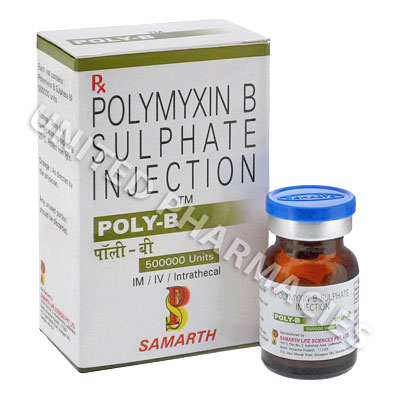Customers also like
Terramycin Skin Ointment (Polymyxin B Sulfate/Oxytetracycline Hydrochloride) - 0.1%/3% (14.2g)
our best price : $8.30
Terramycin Ophthalmic Ointment (Oxytetracycline Hydrochloride) - 3.5g
our best price : $46.24
Soframycin Cream (Framycetin Sulphate) - 1% (30g Tube)
our best price : $3.47
Accuzon Injection (Ceftriaxone) - 1g
our best price : $4.74
Description
Poly-B is an injection containing Polymyxin B sulfate. This is used to treat infections of the urinary tract, meninges, and bloodstream caused by susceptible strains of Ps. aeruginosa. Poly-B injection can also be used topically and subconjunctivally in the treatment of infections of the eye caused by susceptible strains of Ps. aeruginosa.
Each Vial of Poly-B contains 500,000 units of Polymyxin B Sulphate.
Polymyxin B Sulphate can be administered in a number of different ways.
Intravenous Administration: One vial should be dissolved in 300 to 500 mL of solution for parenteral dextrose injection 5% for continuous drip. A dosage of 15,000 to 25,000 units/kg body weight/day is usually given to adults with no kidney problems. A lower dosage should be given to adults with kidney impairment or to children or infants.
Intramuscular Injection: Dissolve one Poly-B vial in 2 mL sterile water for injection or sodium chloride injection or procaine hydrochloride injection 1%. A dosage of 25,000 to 30,000 units/kg/day should be given to healthy adults. Children and patients with renal problems require a lower dosage.
Intrathecal Administration: Dissolve one vial of Poly-B in 10 mL sodium chloride injection USP. A dosage of 50,000 units once daily is given for 3 to 4 days. This is then reduced to 50,000 units once every second day for at least 2 weeks after cultures of the cerebrospinal fluid are negative and sugar content has returned to normal.
Ophthalmic Administration: Dissolve one Poly-B vial in 20 to 50 mL sterile water for injection or sodium chloride injection USP. Drops should be applied 1 to 3 times per hour.
Clostridium difficile associated diarrhea (CDAD) has been reported with use of Polymyxin B. This can result in problems from mild diarrhea to fatal colitis. If you experience diarrhea, contact your doctor.
Other side effects associated with Polymyxin B Sulphate include albuminuria, cylinduria, azotemia, facial flushing, dizziness progressing to ataxia, drowsiness, peripheral paresthesias, fever, headache, stiff neck, urticarial rash, severe pain at intramuscular injection sites, and thrombophlebitis at intravenous injection sites.
If you have any problems with your kidneys, your dosage will need to be adjusted and you may require medical supervision throughout treatment with Polymyxin B Sulphate.
Do not give Poly-B intramuscularly or intrathecally unless under medical supervision within a hospital environment.
Poly-B should not be used in conjunction with neurotoxic or nephrotoxic drugs including bacitracic, neomycin, streptimycin, kanamycin, tobramycin, gentamycin, amikacin, cephaloridine, paromomycin, colistin and viomycin.










